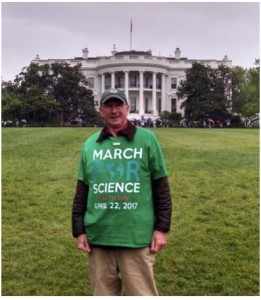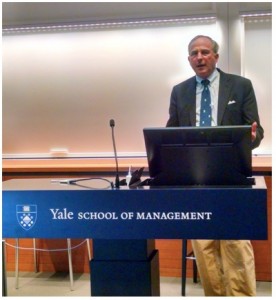
Skip Hobbs South Lawn of the White House, Earth Day 2017 (Hobbs did not jump the fence).
As a past-president of the American Geosciences Institute and alumni member of the Council of Scientific Society Presidents, Ammonite Managing Partner Skip Hobbs felt that he had an ethical obligation to participate in the March for Science in Washington on Earth Day 2017. Scientific innovation has made America great, and must have strong continued US Government support to continue to do so. Dealing with and mitigating the impact of climate change will be the greatest economic, social, political and security challenge of the 21st Century. This cannot be ignored for the good of America and planet Earth.
Hobbs is very concerned about science and climate change policy and has actively participated in professional society government affairs committee work. He was the lead author in preparing the revised draft of the Geosciences and Energy Policy Statement of the Geological Society of America, which is currently under review and open for comment by the GSA membership.
The GSA Geosciences and Public Policy Committee has worked on an energy policy statement for over ten years without reaching a consensus about reducing carbon emissions and transitioning to renewable energy. Hobbs was able to gain the support of representatives of the fossil fuel producing states for the new draft of the energy policy statement, by including US Energy Information Agency (EIA) projections that show that fossil fuels will still supply as much as 78% of total global energy consumption by 2040. Oil and gas producers have nothing to fear, as every barrel equivalent of proved reserves on company books, every barrel of unproven reserves, and most exploration resources, will be developed and sold through mid-century. The challenge will be in recruiting and training the next generation of geoscientists to find the fossil fuel resources that will continue to power society and provide petrochemicals. We have abundant coal resources, but unless clean coal technologies and carbon capture and sequestration are implemented, the carbon emissions pose a very serious threat to climate change.

